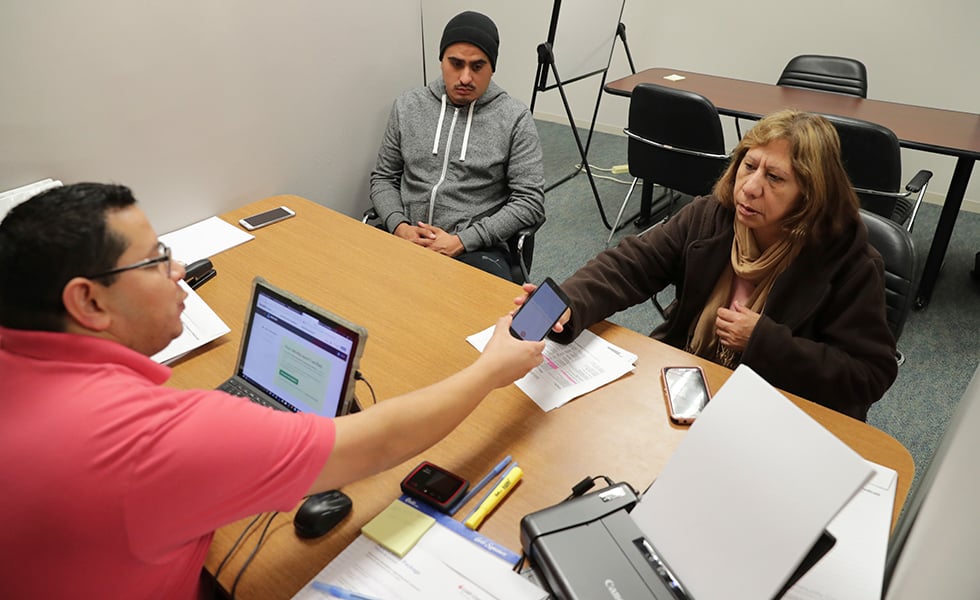
How Mass Deportations Would ‘Devastate’ Texas
The Lone Star State is home to millions of undocumented residents and members of mixed-status families critical to the state’s economic success, yet Texas leaders are cheering on Trump anyway.

Former President and current presidential candidate Donald Trump has promised, if elected, to implement the “largest deportation in the history of our country.” If such an operation were carried out, a second Trump regime could target around 11 million undocumented people in the United States. Trump’s running mate, vice presidential candidate JD Vance, has suggested starting with 1 million deportations a year—a figure that dwarfs the total reached in any year of Trump’s presidency or that of Barack Obama. The proposal has become a rallying cry for Trump’s base, with supporters brandishing matching signs at rallies reading “Mass Deportations Now.”
Texas is home to some 1.6 million undocumented immigrants—second in the United States only to California—and another roughly 1.4 million U.S. citizens in the state live with at least one undocumented family member, per studies in recent years. Unauthorized workers form the backbone of crucial sectors; in the construction industry, up to 50 percent of laborers building the state are undocumented, according to a 2013 survey by the advocacy organization Workers Defense Project. All this means Texas would be uniquely disrupted by Trump’s plans, with the tearing apart of mixed-status families placing a possibly massive burden on the state’s meager social services systems, and the exiling of a chunk of its workforce imperiling the economic development and affordability known as the so-called Texas Miracle.
Yet Texas’ statewide Republican leaders are full-throated backers of a Trump return to the White House, leaving dissenters within the immigrant and business community and Democratic Party to advocate for millions of Texas families, workers, and consumers.

Trump has said that his deportation scheme would follow the “Eisenhower model”—an apparent reference to the 1950s immigration raid and roundup deportation program “Operation Wetback,” named after a racist slur. The raids, which lasted around a year, rounded up hundreds of thousands of Mexicans—including Mexican Americans—who were rounded up by truck, train, boat, and plane and deported. Around two decades prior, up to 2 million were deported, again including U.S. citizens, in a yearslong effort known as “Mexican Repatriation.”
In an email to the Texas Observer, Democratic Congressman Joaquin Castro said Trump’s proposal was also a threat to Latino U.S. citizens. “The last time the United States launched a mass deportation effort … U.S. citizens of Hispanic descent were rounded up and sent to Mexico—a place that many had never been before. The mass deportations that Trump is proposing would be devastating for our economy and dangerous for American Latinos.”
Stan Marek, CEO and owner of the Houston-based construction enterprise Marek Family of Companies and a cofounder of Texans for Sensible Immigration Policy, told the Observer that mass deportations would exacerbate an existing construction labor shortage. Plus, he added, there is no easy, reliable way for employers to verify someone’s immigration status—and there has not been any significant immigration reform or citizenship pathway created for undocumented people since Congress passed the Immigration Reform and Control Act of 1986.
Marek, a lifelong moderate Republican, instead proposes a mass work authorization plan to protect immigrant workers from the possibility of employer exploitation, increase the labor force, and ensure workers can pass background checks and pay federal income taxes.
“There hasn’t been any way for a worker, a blue-collar worker, to come into this country and get a job legally since 1986,” Marek said, referring to the Immigration Reform and Control Act. (Some short-term temporary and seasonal work visas for blue-collar workers do exist.) Now, Marek said, we have a situation where we have millions of undocumented in this country, “and now we’re totally dependent on it because we need them.”
Beyond construction, heavily undocumented workforces labor in agriculture, food processing, house cleaning, and other industries. “Immigrants exist across our economic spectrum. They’re everywhere. They’re us,” said Jaime Puente, director of economic opportunity at the progressive think tank Every Texan. “When we talk about eliminating them from our society, it’s like not just talking about cutting off a finger. We’re talking about cutting off entire legs from the thigh down.”
Nationwide, the shock would be on par with the Great Recession of 2008, according to economic projections from the American Immigration Council. And, despite claims of politicians like Trump and Vance, “Mass deportations are not going to lead to more Americans getting jobs,” said Aaron Reichlin-Melnick, senior fellow at the American Immigration Council. “There’s no evidence for that whatsoever.”
In a recent X post, Trump announced more details of his envisioned machine for deportations and targeting transnational crime: He wants to invoke the Alien Enemies Act of 1798—the same law that formed the basis of the executive order that put Japanese Americans in internment camps during World War II.
The likely scale would be much more massive than the internment of Japanese Americans during World War II, when approximately 112,000 people were displaced, said Reichlin-Melnick. And some civil liberties may have to head for the chopping block to achieve Trump’s goals.
Presently, Reichlin-Melnick explained, the United States does not have a system designed to find undocumented individuals who are not already on the government’s radar. Immigration Customs and Enforcement (ICE) does not know the identities and addresses of the majority of undocumented people. In order to carry out a mass deportation operation, agents would need to go out into communities around the country to find people—who are not already on their radar—and round them up.
“You create a surveillance society in order to root out millions of people, because there’s really no other way to do it,” he said. “Creating an apparatus to hunt down and identify millions of undocumented immigrants would require turning the United States into a police state.”
ICE raids impact more than just immigrant families, according to Caitlin Patler, a researcher at the University of California, Berkeley focused on the detentions and deportation pipeline. These operations are “traumatizing for entire communities, whether somebody’s directly impacted or not,” she said. “Your kid would go to school and next to them there would be an empty desk.”
Raids also negatively impact the health of children whose families have been targeted for detention or deportation. Patler said even unborn children have been impacted, and her work has found the following outcomes: children having trouble sleeping, trouble eating, crying uncontrollably, and “clinging to their remaining parent, refusing to leave the house because they’re so scared that the other parent will disappear or be taken from them in the same way that the first parent was,” she said. “You can see a very clear pattern of worsening health among people exposed to the deportation and detention systems.”
The fear of a raid, detention, or deportation also pushes immigrant and mixed-status families to avoid interacting with law enforcement. University of Colorado Denver professor Chloe East said that creates problems for police, who rely on community members for tips and interviews when solving crimes.
Economically, however, there is one sector that would likely flourish under a mass deportation regime: the prison industry. Texas is already home to some of the nation’s largest immigration detention centers, many of which are operated by private, for-profit companies.
If deportations increase, the feds would likely build or lease even more space for the detainees. Because Trump has proposed mobilizing troops for immigration enforcement, mass military camps also aren’t out of the question, said Bob Libal, an Austin-based consultant at Human Rights Watch who has worked on immigrant detention issues for years.
“I thought the idea of favorably talking about Japanese internment was over in this country,” Libal said. “And yet—here we have people talking about the utilization of mass deportations in a positive light. And frankly, that should terrify everyone living in Texas, whether you’re an immigrant or not.”



